Can Francia Márquez become Colombia’s first Black vice president?
A 40-year-old single mother who once cleaned homes for a living and made a name for herself as an environmental activist is breaking new ground in national politics


One man after another speaks into the microphone but nobody is paying any attention. The crowd that fills the central square of Santander de Quilichao, in Colombia’s Cauca department, is watching the sun go down distractedly. They have not come to see these men.
The mood suddenly changes. The person everyone was waiting for has climbed onto the stage. The public roars. “Long live Francia Márquez, damn it! The people will not give up, damn it!” She smiles without showing her teeth, in her yellow dress, with her knitted bag hanging from her shoulder. When she begins to speak, the mood has changed completely.
“They say that men don’t have abortions, but I say they do. In Colombia they have an abortion every time they walk out on their children. They are aborting their parental responsibility!” she begins.
A few poker faces are seen on stage. The crowd breaks out in applause. She does not change her expression. She is a 40-year-old Black woman who as a child wanted to marry a white man. She left her house under death threats for defending her land, raised two children by herself because the fathers disappeared, and cleaned other people’s homes to feed her family. She is a Colombian who never imagined being up there on that stage. A Colombian who experienced fear for half her life and had her first child at the age of 16. That is why now, Francia Márquez fearlessly speaks her mind.
“I didn’t ask to be in politics. But politics messed with me and now we’re messing with it. You were not paid to come here, you came here because you wanted to. And standing before you is your daughter and your vice president.”
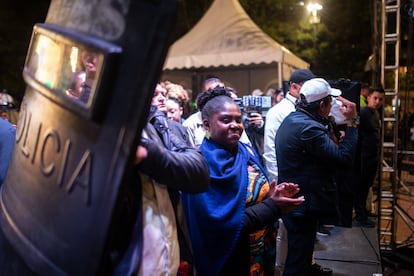
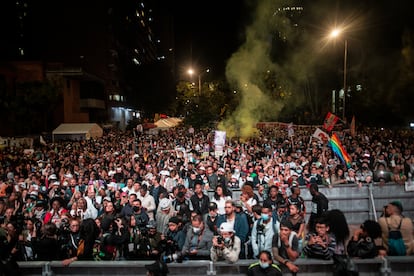
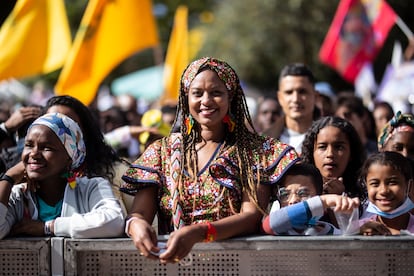

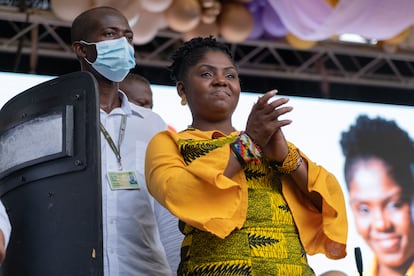

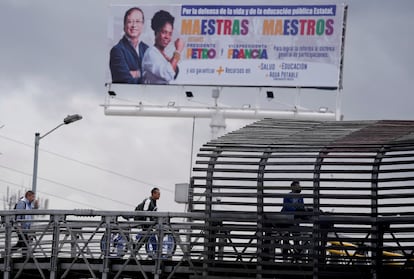
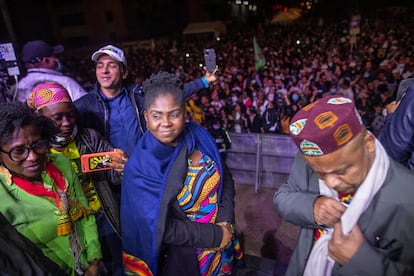
Francia Márquez has broken all the rules of power in Colombia. Today she is close to being the first Black woman to be elected vice president of Colombia. In fact, she is a left-wing Afro woman in a country where the left has never governed. She earned the position where she finds herself now in March, when she was the third most voted candidate in the primaries of all the coalitions that are running for election, attracting nearly 800,000 votes. The result forced Gustavo Petro, the candidate with the best chances to be the next president, to make her his number two. It’s no secret that those weren’t his plans. The relationship has not been easy. But here she is.
“We voted for Francia”
If Petro had closed the door on her, Lina Alegría would not be voting for him next Sunday. Because the Caucanos have never mattered to anyone, she says. And the Caucanas, even less so. “Alternative men have been just as macho as those on the right. Francia Márquez represents women, this is her territory. We are voting for Francia,” says this 21-year-old who is a member of a feminist group called Insurrectas. The association was created here, in the Colombian Pacific, in the department most badly ravaged by violence and poverty, used as a drug corridor, exploited for illegal mining. Cauca is a cradle of misery where the central state is just as absent as the thousands of missing young people who are sought by thousands of desperate mothers. Women like the ones who this morning fluffed up their curls, got dressed in bright colors and came to wait under a tent in the sizzling sun to cast their eyes on not just a Black woman, but on “our hope for a dignified life.” For some of them, Francia Márquez represents the first ray of hope they have ever felt, someone who can understand their pain:
“It is painful to have to give birth to a child, to nurse it and then to have to bury it because a group has taken your children away, killed them, made them disappear. Let’s stop supplying the bodies!”
Márquez has traveled to her own region this weekend, although for her there are forbidden territories. She cannot go near La Toma, her community in Yolombó, in Suárez, where she was born four decades ago. Death threats forced her to move away in 2014 with her two young children, as by then she had become a social leader capable of confronting mining businessmen. Her figure has not stopped growing since then, and neither have the threats. The women waiting for her in Santander, about 200 of them, express a mix of fear and emotion ahead of the arrival of the activist whom they consider a walking miracle. “Security isn’t very good around here, you know? But all of us together will protect her”, smiles Yisel Carabali, who has a terrifying story to tell. She had not set foot on her territory again until today, after being displaced last December by the threats that had already claimed her brother’s life. She is a traditional healer, “a misnamed witch,” she says between laughs before getting serious: “They might kill me, but I won’t go with any group.”
The only men on view this morning, although they number in the dozens, are trying to go unnoticed. This day has little to do with them. They are part of the enormous protection detail that follows the candidate around. There are soldiers with military weapons, policemen with pistols, and indigenous guards with wooden canes, a symbol of their authority in these territories. A police officer with a heavy shield protects France as she gets out of the car, one of seven vehicles in the motorcade. The other men make a corridor to protect her while the women sing and dance; there is a strong smell of incense.
“From resistance to power, until dignity becomes customary,” Francia begins.

Her direct, critical, sharp rhetoric connects with people here as much as it rubs people the wrong way in other parts of the country. Márquez’s emergence on the political stage has generated a wave of criticism. In a deeply centralist country like Colombia, coming to power from outside Bogotá is difficult. To do it from Cauca, you have to break inertia. Most of her critics point to her “poor preparation,” while a few others, the loudest, resort to racism. One singer referred to her as King Kong, to which Márquez responded by sending her “an ancestral hug to help her heal.” The journalist Daniel Samper Pizano wrote about her: “I admire her as a brave woman, a popular leader, an environmental defender and a fighter capable of overcoming the obstacles that Colombia places before Black people, poor people and women. Her life and struggles are inspiring examples. They guarantee good faith, honorability and courage, but not preparation, experience or wisdom. They are not useful for running a nation. Those traits alone are not enough to govern, much less a country as complicated as Colombia.”
“Those messages of ‘you don’t know, you don’t understand’... You are not my parents. We are not asking for permission,” notes Márquez. “You wrote history and now we have the opportunity to lay the foundations of a new one that will allow our children to inhabit a better place.”
Márquez studied law in Cali to bring knowledge to her struggle as an environmental activist. “I took seven years; not because I didn’t have the ability, it was because I didn’t have the resources.” In 2018 she won the Goldman Environmental Prize, the most prestigious award for an environmentalist. And two years later she announced her desire to be president of Colombia, a dream that remains intact and sometimes sneaks into her speeches as if unconsciously. “President too, but first vice president,” she concedes with a laugh.
The Cali of Márquez
From Santander de Quilichao to Cali there is an hour and a half by road. It was the path that Márquez took when she fled one night with her children to save their lives. Commune number 21 of the world capital of salsa became their second home. And here, where taxi drivers warn visitors that it is a dangerous area, the candidate landed on Sunday among hundreds of people who had been waiting for her for hours watching music groups and dancers go by on stage.
“The politicians come here to buy our conscience. But I don’t have to come because I already live here, this is my second home,” she tells the crowd.
“This is your house, Francia!” the crowd shouts back. Cali became the epicenter of massive protests last year that brought thousands of people to the streets across the country. The strikes paralyzed the third most important city of Colombia for more than two months during which clashes between protesters, neighbors and security forces claimed the lives of more than 40 people, most of them youths. In the middle of the trenches that shielded the neighborhood of Siloé, a territory that neither the police nor the army dared enter for weeks, Márquez walked in without bodyguards to chat with the young people inside.
The candidate is encouraging the people of Cali to take their “resistance to the polls” next Sunday. It was in that city that a young Francia worked cleaning houses. That is the memory that she uses the most when she speaks in public, the one that serves to connect with those who listen to her here and the one that she uses to annoy those who listen to her in Bogotá.
“They told us that politics was not for us, that our place as Black women was as domestic workers, to make their houses beautiful, to raise their children, to come back here to bury our own. These chains of oppression must be broken.”
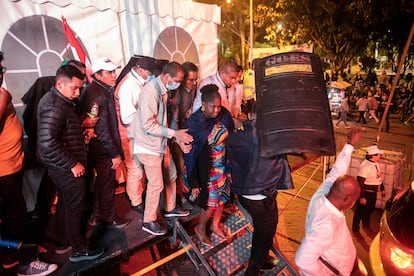
Petro and Márquez are leading all the polls going into the first round of voting, with a huge margin over the second team. He is a man who has been in politics all his life; she is a newcomer who pulls the crowds. Their relationship has not been easy, but they have found a way to complement each other. They are good for each other. Márquez reconciles Petro with women and with feminism, an issue on which he has slipped often. It brings him closer to Cauca, Valle, Chocó and the regions where the majority of Colombia’s Afro population lives. And Petro boosts France with his voters. She’s riding that wave as a first round. Then she wants to aim right for the top.
Tu suscripción se está usando en otro dispositivo
¿Quieres añadir otro usuario a tu suscripción?
Si continúas leyendo en este dispositivo, no se podrá leer en el otro.
FlechaTu suscripción se está usando en otro dispositivo y solo puedes acceder a EL PAÍS desde un dispositivo a la vez.
Si quieres compartir tu cuenta, cambia tu suscripción a la modalidad Premium, así podrás añadir otro usuario. Cada uno accederá con su propia cuenta de email, lo que os permitirá personalizar vuestra experiencia en EL PAÍS.
¿Tienes una suscripción de empresa? Accede aquí para contratar más cuentas.
En el caso de no saber quién está usando tu cuenta, te recomendamos cambiar tu contraseña aquí.
Si decides continuar compartiendo tu cuenta, este mensaje se mostrará en tu dispositivo y en el de la otra persona que está usando tu cuenta de forma indefinida, afectando a tu experiencia de lectura. Puedes consultar aquí los términos y condiciones de la suscripción digital.








































